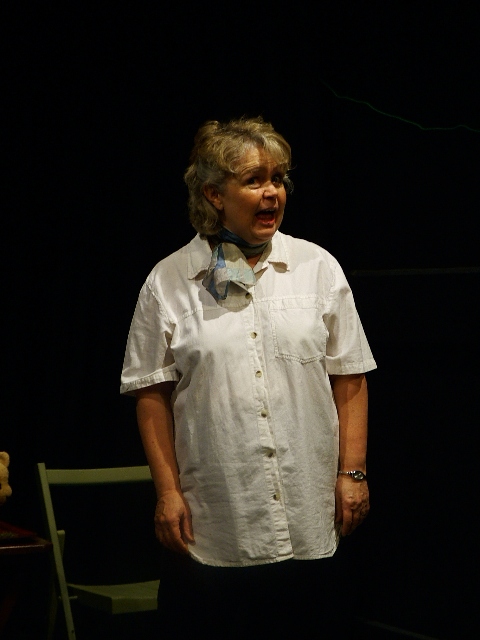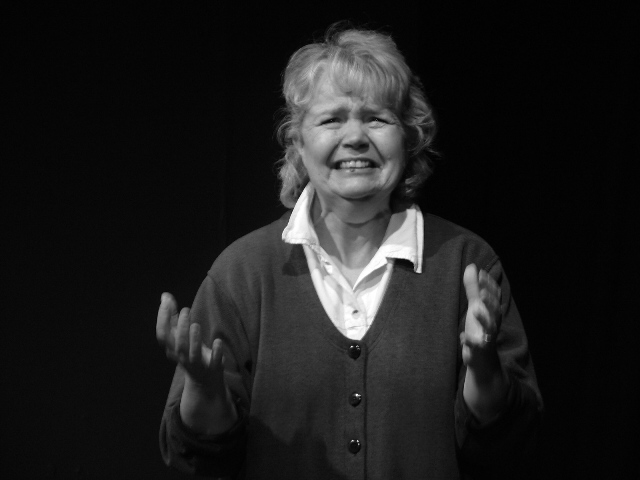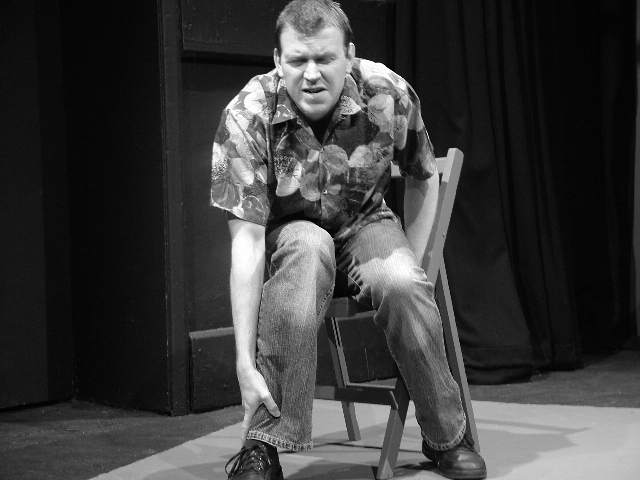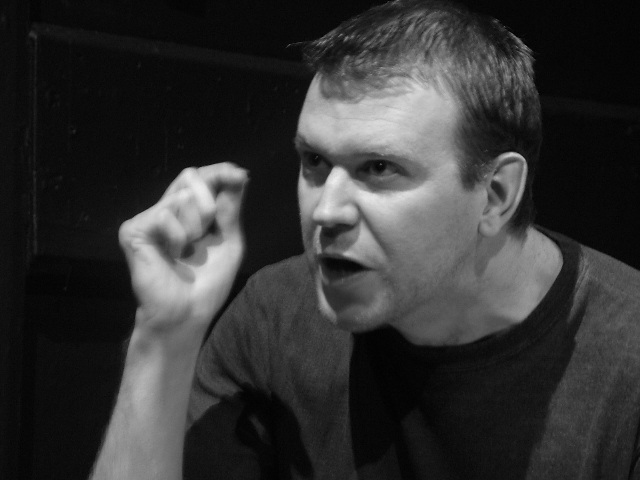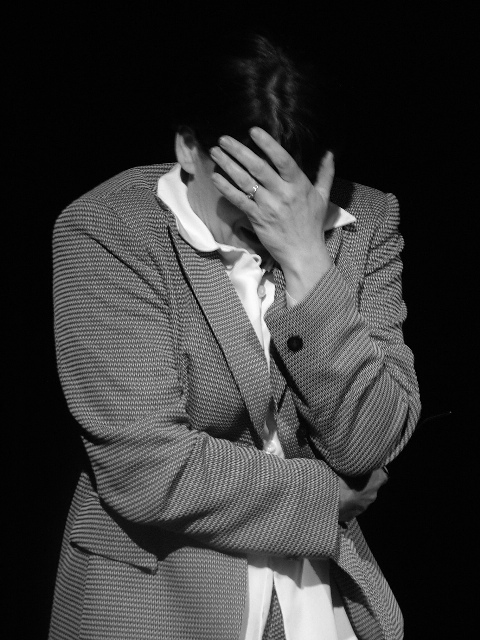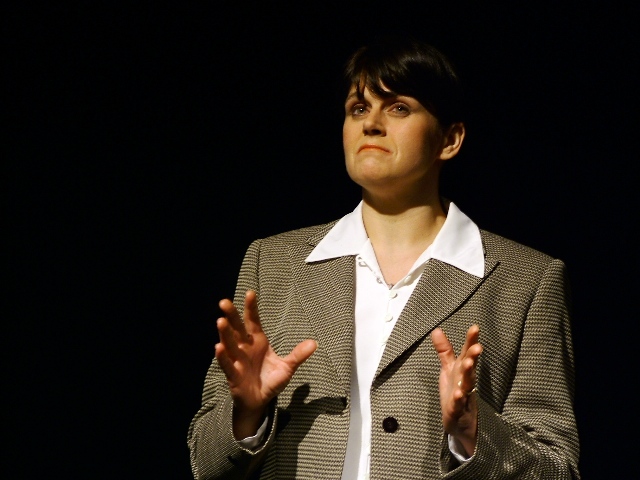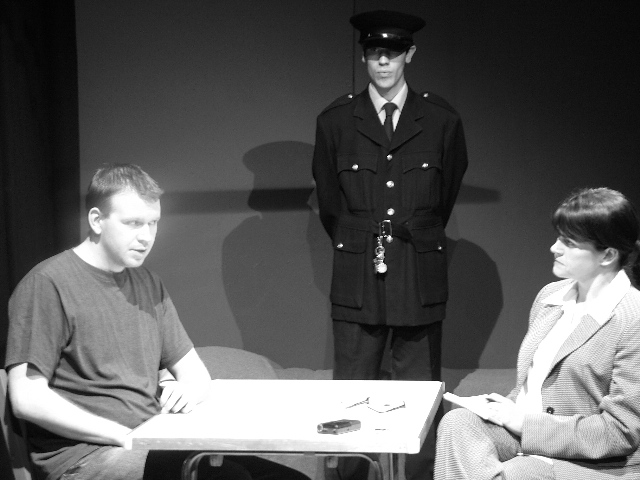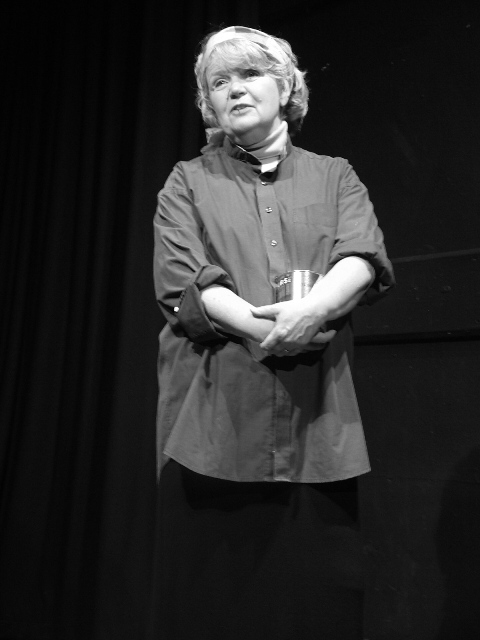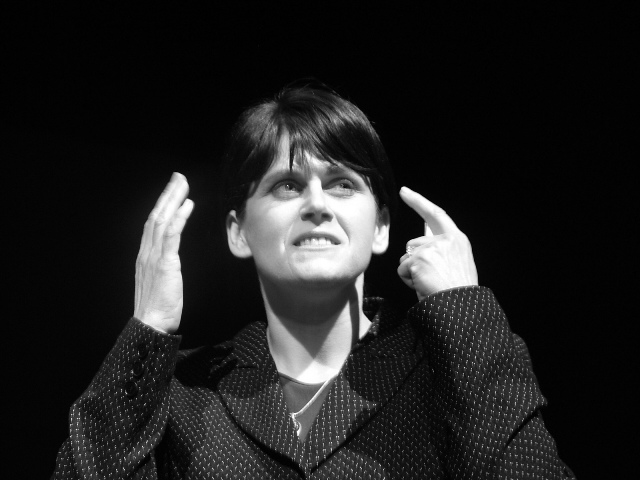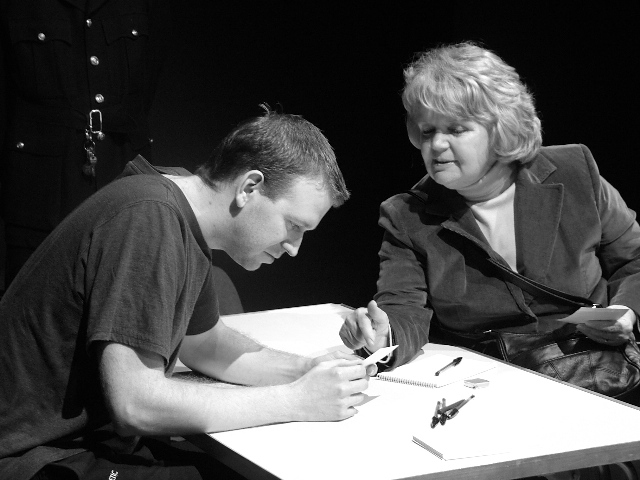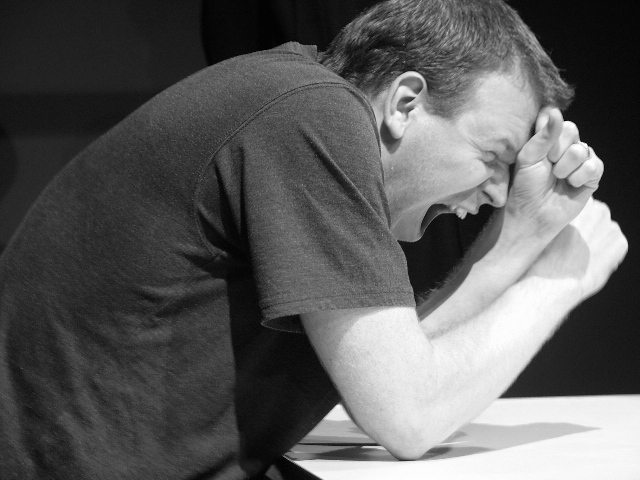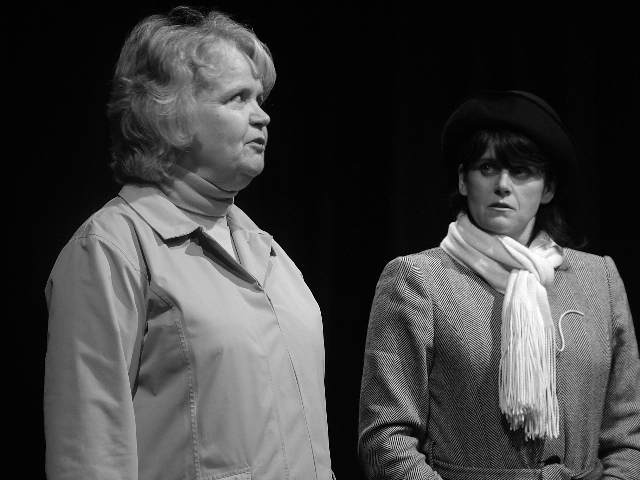The Bench Production
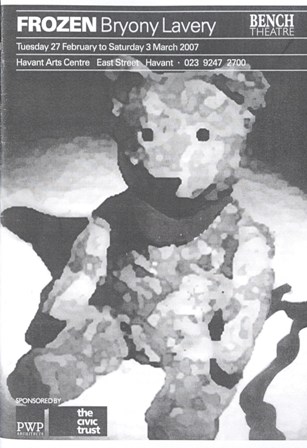
This play was staged at Havant Arts Centre, East Street Havant - Bench Theatre's home since 1977. The production was voted 'Best Amateur Drama' in The News 'Guide' Awards 2007.
Cast
| Agnetha | Megan Green |
| Ralph | Nathan Chapman |
| Nancy | Ingrid Corrigan |
| Guard | Sean Buchan |
| The Voice of David | Darryl Wakelin |
Crew
| Director | John Batstone |
| Producer | Andrew Caple |
| Stage Manager | Jo Wakelin |
| Assistant Stage Manager | Sally Hartley |
| Set Design | Pete Woodward |
| Lighting Design | Andrew Caple |
| Lighting Operator | Julie Wood |
| Sound Design and Operator | Darryl Wakelin |
| Photography | Peter di Fonzo |
| Poster and Flier Design | Pete Woodward |
| Programme Editor | Derek Callam |
| Front of House Manager | Zoë Chapman |
Director's Notes
I have been a Bench member for 13 years (not I trust an unhappy omen) and never once regretted the nearly 40 mile round trip I have to make, often on a small motor bike, to come to meetings, Club nights, auditions, rehearsals and performances. Not to mention social jollies. This is because I know I am going to meet genial, enthusiastic folk whose appetite for theatre knows no bounds. To this enthusiasm The Bench adds, as well as a variety of talents, enormous energy and a willingness to work hard....this usually on top of a full working life. All these together provide a consistent level of performance across five or six productions each year which makes their work enjoyed and admired across the region.
Amongst various others I have been involved, as actor or director, in plays as diverse as Habeas Corpus, Our Country's Good, Much Ado About Nothing, Racing Demon, Broken Glass, Top Girls, A Memory of Water and The Weir. It is this diversity coupled with the preparedness to take on challenges which is the keynote of the company.
The last few months demonstrate this beautifully. Almost the whole company was involved since last summer in the vast technical and imaginative undertaking of 'His Dark Materials'. The production was notable for its combined activity, its ingenuity and the way it stimulated the mind and the imagination. The creation and presentation of the demons, for example, were remarkable.
No sooner was the last prop put away after HDM than work began on tonight's play, 'Frozen'. Indeed the play had been cast already. It is difficult to conceive of two more different productions. In conception, size and scope they are poles apart. But both plays present challenges, to the company and its audiences alike. Like its predecessor Frozen contains dark materials, but like it, the playwright, Bryony Lavery addresses them positively without sentimentality or sensationalism, and above all with integrity.
Personally, after fifty years of theatre-going, I believe in the theatre both as a place of escaping and delight, 'pure pleasure' as you may say. But also as a place where we can confront serious issues in our own lives and in the world around us, perhaps asking questions of ourselves in the process. Put another way, not simply to confirm our prejudices but to open our minds and sensibilities to other possibilities. To do this may, of course, be uncomfortable but, one hopes, if the play and the performance is good enough, finally enriching. Cathartic, as the old word has it.
This play bravely tackles harshly real subjects: child abuse, paedophilia, child murder, from a range of perspectives. Some may think these are taboo areas. Unfortunately they are with us all the time. What do our responses tell us about ourselves as human beings?
The three people in this play are all frozen: one in hope, then pain, another in obsession and another in conviction about her theories. During the course of the action, over twenty years for two of the characters, the metaphorical ice floes melt and more is revealed to them and to us, hitherto unacknowledged or denied facets of what it is to be human.
The way the play is structured reinforces this progress. We move from monologue to duologue as contact with another is established or explored. But never, we notice, do all three meet together. What does this tell us?
This process is intriguing and intensely dramatic. Herein lies the skill of the writing. The audience is drawn in and held on the edge of their seats and can undertake with these people a journey from darkness to some sort of light. There is pain, of course, but because as used to be said of one of the national newspapers, 'all human life is there', there is pleasure as well. (There are even jokes!) When the play was performed at the National Theatre four years ago, to universal accolades, the part of Agnetha was played by a well-known T.V. comedienne.
Frozen was first performed in 1998 and won the Best New Play Award. Kate Kellaway interviewed Bryony Lavery for The Observer in 2002 when the play opened at The National. This is part of what she wrote:- 'If you were asked to guess, you would suppose Frozen to have emerged out of the Sarah Payne case: it mirrors it so closely. A girl disappears, murdered by a paedophile, leaving her family's life disfigured. How did Lavery feel when reality turned into a dire impersonator of art? She murmurs: 'There was something iconic about it - the child snatched from a cornfield - unbearable.' And while there was 'no connection' in rational terms between the play and Sarah Payne, Lavery acknowledges the synchronicity observing the odd way in which, when one becomes focused on a subject, it's suddenly everywhere. She has felt, she says, like a "magnet picking up iron filings".
Last year Frozen was one of the most produced plays in the U.S. In this country there were successful productions in Bath and Keswick that I know of. We are pleased and privileged to be offering it to this part of the UK for the first time we think.
When I first came across 'Frozen' four years ago I was struck by its timeliness and sad relevance to the world we live in. This has been reinforced this week with the publication of the UNICEF report of where Britain stands in its concern and treatment of children among the world's 21 richest nations. A shaming last position.
Of course, I'm not suggesting that Bryony Lavery's play will put this right. But it will surely help to focus our concern. Ralph's early child abuse and the easy availability of the material he lovingly collects is a painful reminder of the horrendous consequences that the evil we meet in the media everyday can produce.
Part of Nancy's emergence from her frozen grief is her slow realisation of the love she has denied Bridget, her living child. It's a moving moment when she recounts her return after years of effectual rejection, "Hello, Mum. It's me."
As Agnetha points the way in public when she asks, "What discoveries do we bring back from that foreign terrain (the criminal brain) to help make our own inner and outer landscape warmer, safer, kinder, better?"
John Batstone
Reviews
The NewsJames George
Performances shine through intensely dark subject matter
Every now and then a critic's objectivity is challenged when they are subjected to a piece that produces in them an extreme of passion. It can be either hatred or love of the show in question but the objectivity is challenged, regardless. I loved Frozen as a piece of writing - but did I love Bench Theatre's presentation? Well, yes I did.
John Batstone's production of what is essentially a three-hander is strong stuff, and in the very capable hands of Nathan Chapman, Ingrid Corrigan and Megan Green, Bryony Lavery's script really does take flight. It's not easy subject matter either - a woman coming to terms with the death of her child at the hands of a paedophile. But there are surprising, lighter moments here and there and, all told, it's expertly handled.
Chapman is, frankly, stunning as the paedophile, Ralph. That's a performance and a half. Both Corrigan and Green are up there, too, but the very nature of the role left me astounded at Chapman's work. Vocally, Corrigan reached the heights, although I wish she and Batstone could have found more physical variety in her performance, and Green's American accent slipped very occasionally. But these are criticisms for the sake of criticism.
The play is dark, its language fetid and foul but its soul is big, shiny and profound. Highly recommended.
The News, 28th February 2007
